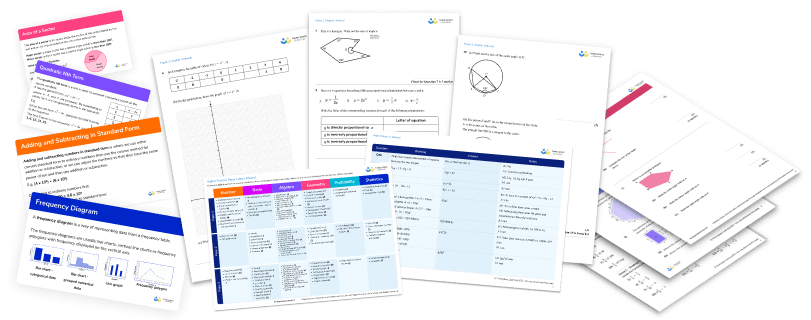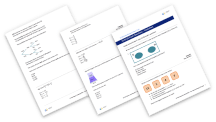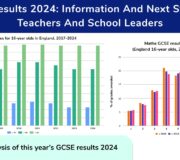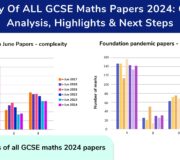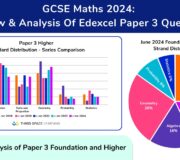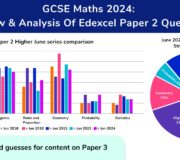A UK Teacher’s Guide To Choosing Your GCSE Exam Board (Maths): AQA Vs Edexcel Vs OCR
Here we take a detailed look at the three leading options for GCSE exam boards in the UK – AQA, Edexcel and OCR – and highlight their features and differences to help you understand the choice your school has made, or guide you in making your own choice of GCSE exam board for your maths students.
This article is part of Third Space Learning’s ongoing series of articles analysing the content and approach of the different exam boards and how they will be testing your students at the end of Year 11. Much of the data we’re using has been collected as part of the development of our own maths curriculum which our online tutors and students work through in their one to one GCSE maths tuition sessions.
Whether you are new to your post or school, or you are just looking to better support your pupils, choosing an exam board is a big decision.
There are many factors to consider: question style, format of exams, resourcing and training costs, along with the need to convince school leaders, headteachers and your team as to why a change of board is going to benefit students and their outcomes.
Each exam board has their own individual philosophy which informs exam formats and question styles. It is important to take some time to reflect on which board is most aligned to your student’s needs.
This article is not intended to promote a particular exam board but to provide an overview and comparison of the major examination boards to help you make a decision which is right for your school next academic year. Please note that this article focuses on GCSE maths exams in particular as opposed to other general qualifications such as english literature and english language. Additionally, the range of evidence may be different for A Level maths.
Set of 25 Printable GCSE Maths Questions
Try these challenging GCSE maths questions with your students in class. They all include answers on a separate page and are organised by difficulty!
Download Free Now!Stated objectives of each exam board and their specification
Edexcel exam board
Pearson Edexcel states that they have designed a specification that ‘supports great maths teaching and helps students become confident and successful mathematicians.’ They highlight that their assessments are written in clear and simple language, making them accessible to all students to maximise opportunity to demonstrate their mathematical ability.
AQA exam board
AQA celebrates the diversity of maths and aims to equip students with the right skills for their destination. They state that they design ‘qualifications and support to enable students to engage with, explore, enjoy and succeed in maths’. They aim to put students at ease in exams by starting off with multiple choice questions which all students should be able to demonstrate their knowledge and understanding in.
OCR exam board
OCR aims to encourage students to develop a positive attitude towards maths and recognise the relevance and application to daily life by designing contexts which are authentic. They highlight that one of their main focuses is ensuring that question papers are clearly written and laid out to students, which are written to a published set of GCSE Maths Accessibility Principles.
AQA vs Edexcel vs OCR
Below we look at key aspects of each exam board to highlight some of their main differentiators.
Although the Welsh exam board WJEC is also a member of the JCQ, we have not included it here in order to give a thorough comparison between the three main exam boards using the 1-9 system. AQA, Pearson Edexcel and OCR all have plenty of resources to support students who are undertaking either form of assessment.
Where relevant we’ve included some comparison tables to help you see differences at a glance.
GCSE exam format
The format for the exam series of each board is similar, with each consisting of three 90-minute exams, one non-calculator exam and two calculator exams. Edexcel and AQA both have their non-calculator as paper 1, whereas OCR differs by placing the non-calculator paper in the middle of the series.
Additionally, each paper for OCR is out of 100 marks rather than 80. OCR states that this is to allow more scope for awarding method marks and rewarding students for each correct step towards an answer.
You may want to reflect on whether more opportunity for method marks is more suitable for your students and if the placing of the non-calculator paper first or second informs your teaching and exam preparation.
All exam boards state that the papers increase in difficulty in terms of content and language as the papers progress but one notable difference with AQA is the presence of multiple-choice questions at the start.
| Exam board | Number of papers | Length of papers | Sequence of the papers | Number of marks per paper | Total number of marks |
| Edexcel | 3 | 90 minutes | Paper 1: Non calculator Paper 2: Calculator Paper 3: Calculator | 80 marks | 240 marks |
| AQA | 3 | 90 minutes | Paper 1: Non calculator Paper 2: Calculator Paper 3: Calculator | 80 marks | 240 marks |
| OCR | 3 | 90 minutes | Paper 1: Calculator Paper 2: Non calculator Paper 3: Calculator | 100 marks | 300 marks |
GCSE exam syllabus content and specification
Assessment objectives are set by Ofqual for quality assurance and will be the same for all exam boards. In summary, the three assessment objectives are:
- AO1: Use and apply standard techniques. This is focused on recall of facts, terminology, and definitions, using mathematical notation correctly and carrying out routine procedures.
- AO2: Reason, interpret and communicate mathematically. This incorporates reasoning, proof, deduction, and arguments.
- AO3: Solving problems within mathematics and other contexts. This entails translating problems into mathematical and non-mathematical contexts, making connections between areas of mathematics, interpreting, and evaluating results and methods.
The weighting of each assessment objective is the same for all three boards but differs from foundation to higher tier.
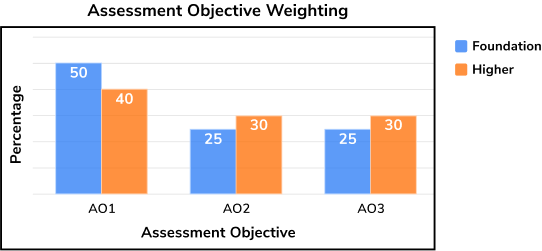
Subject content across all three boards is also the same as set out in the Department for Education’s Mathematics GCSE subject content document. The weighting of the topic areas again differs for higher and foundation tier.
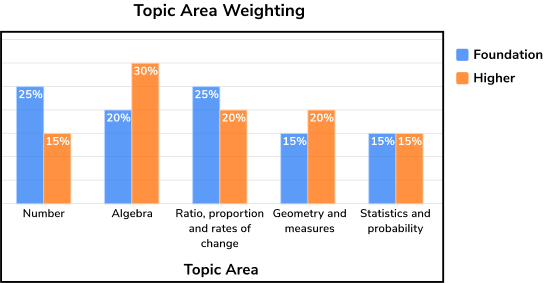
Although the content is common to all exam boards the presentation of the syllabus differs between the specifications. AQA and OCR display the content in user-friendly tables while Edexcel writes them as a list.
OCR and AQA use the following headings: ‘Initial’ (OCR)/’Basic foundation’ (AQA), ‘Foundation’ (OCR)/’Additional foundation’ (AQA) and ‘Higher’. Content is cumulative so higher tier students could be assessed on any prior skills from foundation.
Edexcel differentiate content by identifying topics assessed at higher tier only in bold font.
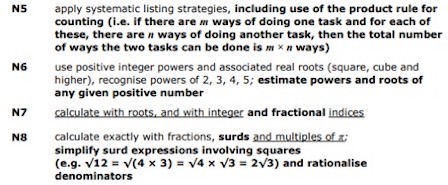
None of the awarding bodies provide a formula sheet within the assessment, so do check the specification of what students are required to learn and recall. Any additional formulae required will be given within the assessment.
See also: GCSE maths formulas
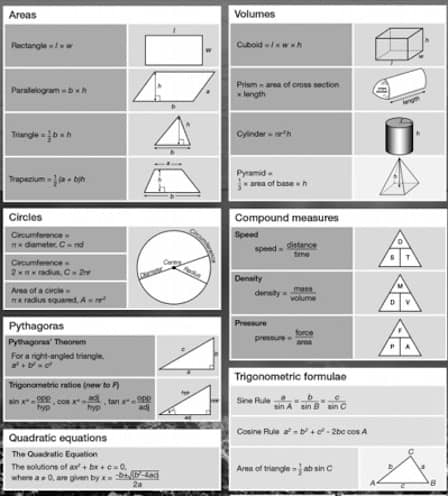
Style of question for each GCSE exam board
It would be wise to look carefully at past papers to compare styles of gcse maths questions and paper presentation to make an informed choice about what would be best suited for your students.
You may find that even font type and presentation could influence your students perception of the papers, as illustrated in the example questions below. They’re quite different!

AQA provides lines for students to show working on whilst Edexcel and OCR provide an open space, unless students are expected to write a sentence of two as part of a response, in which case lines will also be given.
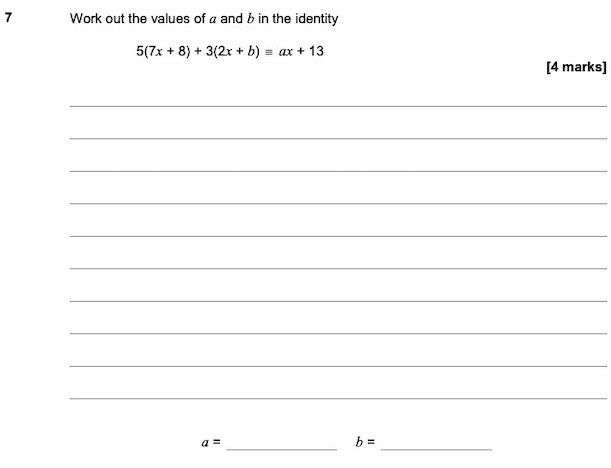
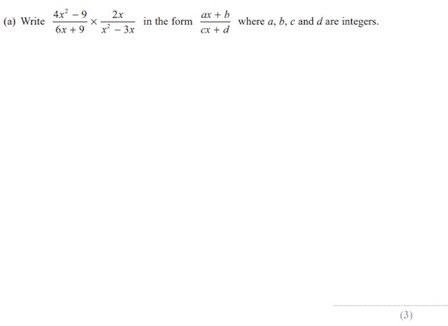
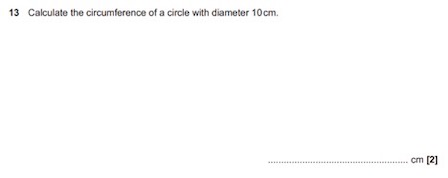
AQA has around five multiple choice, 1 mark questions at the start and part way through the paper. This makes the questions accessible for all students to provide an answer, but you will need to prepare your students to make informed choices.
AQA includes questions where students must select an option by ticking a box before being prompted to provide a reason on a clearly indicated set of lines. OCR have these questions too and will often give short sentence prompts within the answer space to start students off. Edexcel have similar questions, but it will be stated that students must give reasons or show each stage of their working within the body of the text.
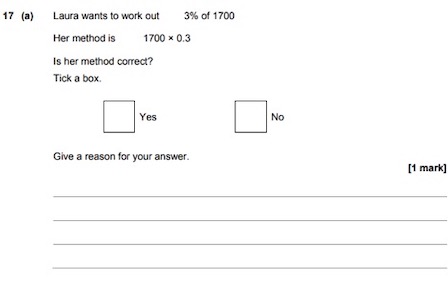

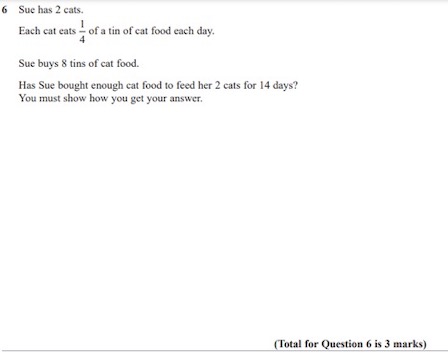
GCSE exam board scheme of work
Each exam board provides a scheme of work to support effective delivery of the qualifications.
OCR provides downloadable Schemes of Work (curriculum planners) for 1-, 2- and 3-year teaching, but also an interactive tool called ‘scheme of work builder’. This allows you to create a bespoke scheme of work using resources provided for the specification, which has been broken down into statements and mapped to individual teaching resources.
Once developed online, they are saved online for future adaptations and can be exported to Microsoft Word. OCR provides a ‘simple steps’ guide to creating a scheme of work which allows you to choose statements from the specification that you want to cover, choose activities mapped to the statements and add notes of additional materials or resources that might be needed for a particular lesson.
Edexcel provides a series of schemes of work, including an interactive scheme of work which covers 1-, 2-, 3- or 5-year teaching, Key Stage 3 to Key Stage 4 transition and low attainers support.
GCSE exam board resources
Each exam board offers support with resources in a variety of ways. They each have a website and subscriber platform where these can be accessed. Below is a list of resources provided free of charge by each exam board, as indicated on their websites.
Edexcel provide exam practise support by presenting their questions in a variety of ways, such as by theme and levels of scaffolding, as seen in their gold, silver and bronze papers. These are great for easing teacher workload.
Shadow papers are particularly helpful when you wish to reassess students or to provide them with a paper which is the same as a past exam but with different numbers. OCR also provide these (they call them ‘Alternative Papers’), plus a wide variety of other free assessment and teaching resources.
AQA provides resources that support lesson delivery for the teaching of the specification.
| Resource | Edexcel | AQA | OCR |
|---|---|---|---|
| Content guidance | Y | Y | Y |
| Key Stage 3 resources | Y | ||
| Mock set papers | Y | ||
| Practice papers | Y | Y | Y |
| Shadow papers | Y | Y | |
| Themed papers | Y | ||
| Skills mapping grids | Y | ||
| Topic tests | Y | Y | Y |
| Tiering guidance | Y | Y | |
| Teacher command word guidance | Y | Y | |
| Baseline tests | Y | ||
| Gold, Silver and Bronze papers | Y | ||
| Common question papers | Y | Y | |
| Problem solving questions | Y | ||
| Check in questions | Y | Y | |
| Worksheets | Y | Y | Y |
| Route maps | Y | ||
| Lesson plans | Y | ||
| Homework sheets | Y | ||
| Basic skills questions | Y | ||
| E-library | Y | ||
| Transition guides | Y | ||
| Topic exploration packs | Y |
Exam board support
Though there may be a cost for some of the more intensive in-person training and workshops, much of the support provided by the exam boards to schools following their syllabus is free.
| Edexcel | AQA | OCR |
|---|---|---|
| Training events Network events Live online training Past training recordings The Right Angle podcast Maths subject advisor | Online training Face to face training Hub events Subject experts | Face to face training Webinars Teacher networks Subject advisors |
GCSE exam grade boundaries
It shouldn’t be considered that it would be easier to achieve better exam results from some awarding organisations than others. GCSE grade boundaries and final grades will differ for each exam series depending on analysis of how students have performed on the papers.
Below is a comparison of the percentage of marks required for each grade on the series of papers that were sat in summer 2019, the most recent summer exam series due to the cancellation of exams last year as an effect of the pandemic and subsequent lockdown.
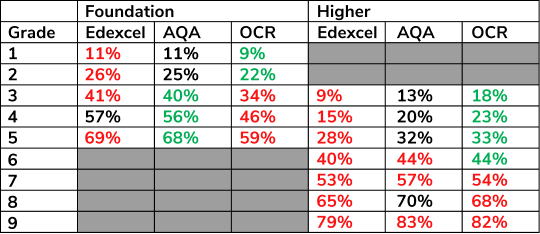
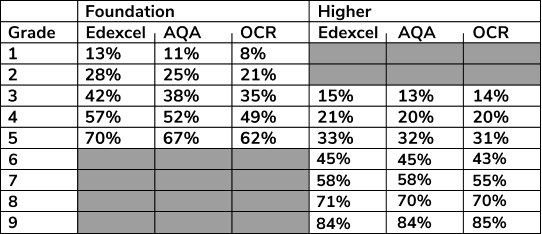
Percentages in red show where a grade boundary has reduced in 2019 and a percentage in green shows where it has increased from 2018.
For the foundation tier, it shows that OCR has lower grade boundaries. It’s worth noting that these papers are out of 300 rather than 240 and for the lower grades, a similar amount of marks are required for all three boards.
For the higher tier, Edexcel has lower grade boundaries up to Grade 6 in 2019, but it is similar across all three boards in 2018.
In 2019, it is notable that Edexcel reduced their boundaries for the majority of grades while they increased for AQA foundation and OCR higher tier.
Additional GCSE exam revision resources
Each exam board also provides additional published resources. You will also find additional resources from CPG and other publishers such as Collins, Cambridge University Press and Hodder Education.
Traditional textbooks are comprehensive in covering the specification, but are a big investment. Increasingly, schools are opting for creating bespoke resources tailored for students’ needs as well as web based resources.
Student books are shorter with exercises in smaller, bite-sized chunks. These are ideal for equipping students with additional practice to supplement in-class teaching.
From my experience, Edexcel Target Grade books are a cost effective resource and an ideal revision workbook for students as it contains worked examples and exercises, with space for students to write in the book.
Mastering Mathematics and Problem Solving books are good sources for applied and interleaved questions, especially useful for increasing student exposure to questions in a variety of contexts.
If you’re looking for online revision, Third Space Learning provides a library of free online GCSE maths revision resources, including GCSE maths worksheets, GCSE maths questions and GCSE maths past papers.
There are also extensive revision guides that can be used for all GCSE maths topics organised by curriculum area:
to Statistics, as well as a large collection of
Read more: How we developed our GCSE maths revision programme & How To Revise For GCSE
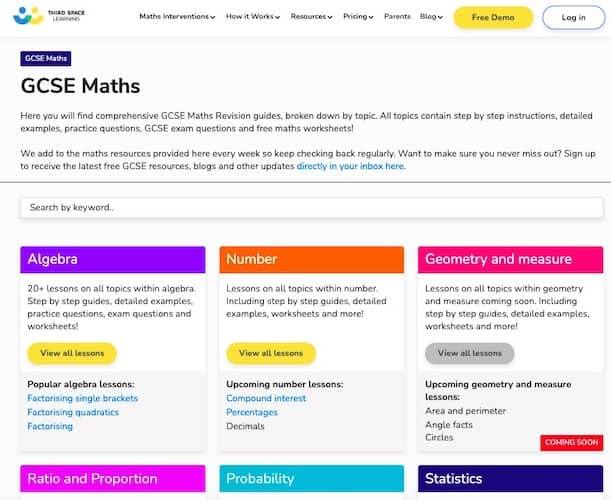
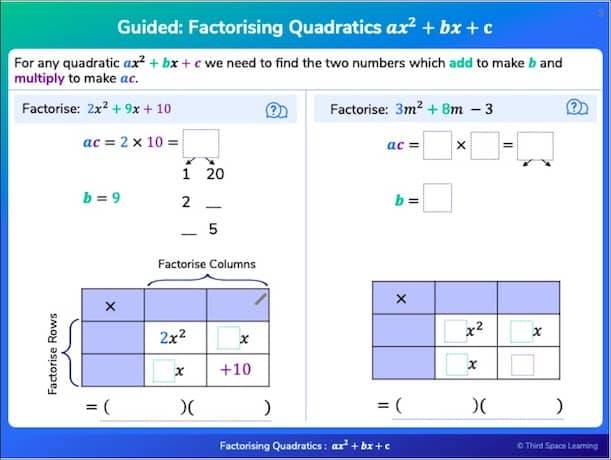
Below is a list of published resources endorsed on each of the exam board websites.
| Edexcel | AQA | OCR |
|---|---|---|
| Student Books KS4 ActiveLearn Purposeful Practice Revision resources Target Intervention resources | Student Books Text Books | Homework book Problem solving book Student book Mastering mathematics |
Other things to consider
There are a variety of other factors that should be taken into consideration when choosing a suitable exam board for your school.
Other things you might want to think about are:
- If you are a Multi Academy Trust, which boards are other schools within the trust using? This can promote collaboration with resources, support, and data analysis.
- Which board has your school previously used and why? How well equipped is your department with resources for delivering your current exam board specification?
- Will you need to invest in additional resources? Which resources are your department using for their current exam board?
- Changing exam boards can be expensive with the need to purchase additional resources, additional training and time required to amend existing resources and schemes of work.
- Which exam boards do your team have experience of delivering?
- Has anyone in your team been an examiner and if so for which board? This would provide an insight to grading systems and facilitate effective CPD on marking and moderation for your team of teachers.
- Which style of paper would suit your students?
- How do your interventions fit with your exam board? The foundation GCSE maths revision course that Third Space Learning offer secondary schools has been designed to match all three major exam boards. Tutors are trained in adapting individual topics where required, depending on the requirements of a particular specification.
FAQs
The three most popular UK exam boards are AQA (Assessment and Qualifications Alliance), OCR and Pearson Edexcel. In addition there is WJEC, the GCSE exam board for Wales, also used in England, and in Northern Ireland there is CCEA.
It’s hard to give a direct answer to this question. AQA, OCR and Edexcel all have their strengths; it depends what you’re looking for. Use the GCSE exam board comparison tables in this article to help make your decision.
No matter which exam board you choose, it is the higher papers that are the hardest and will stretch your students the most. By looking at each specification you’ll get an idea of which exam board will be hardest or easiest for the students you teach.
Matrix of comparison
We have now made many comparisons and hopefully answered most of your questions so to finish, here’s a summary of each GCSE exam board. You will see that overall they provide the same supplementary resources but it is the nature of curriculum resources and exam paper style and format that will require careful consideration to inform your choice.
| Board | Number of marks | Exam builder | Scheme of work | Practice papers | Resources | CPD | Post exam analysis |
|---|---|---|---|---|---|---|---|
| Edexcel | 240 | Exam Wizard | Y | Y | Y | Y | Results Plus |
| AQA | 240 | Exam Pro | Y | Y | Y | Y | Enhanced Results Service |
| OCR | 300 | Exam builder | Y | Y | Y | Y | Active Results |
You can find all of the latest guidance and news from Ofqual on GCSE assessments and qualifications via their gov.uk page. If you have pupils in sixth form, you will also be able to find guidance on AS and A Level exams.
Stay updated for 2024 GCSE season
Join our email list to be alerted to any new changes to GCSE maths exams in 2024.
We’ve got all the GCSE dates 2024 and we will be reviewing the contents of each of the GCSE maths papers in 2024 and taking a good look at the GCSE results 2024 in August.
Take a look at GCSE Maths Paper 1 2024 Analysis And Revision Topic List
DO YOU HAVE STUDENTS WHO NEED MORE SUPPORT IN MATHS?
Every week Third Space Learning’s specialist GCSE maths tutors support thousands of students across hundreds of schools with weekly online 1 to 1 maths lessons designed to plug gaps and boost progress.
Since 2013 these personalised one to 1 lessons have helped over 150,000 primary and secondary students become more confident, able mathematicians.
Learn about the GCSE revision programme or request a personalised quote for your school to speak to us about your school’s needs and how we can help.
